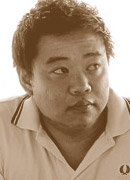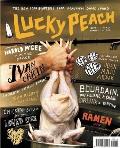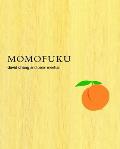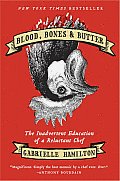
It's safe to say that whatever publisher McSweeney's does, they do with flair.
Lucky Peach, their new quarterly food journal, is no exception.
Lucky Peach is the brain child of McSweeney's Books co-publisher Chris Ying (who serves as editor-in-chief), acclaimed chef David Chang (of Momofuku fame) and food writer Peter Meehan. Each issue of the quarterly will focus on a theme. Issue one, which debuted this summer, is all about ramen, a 170-plus-page "ramencyclopedia," featuring contributions from Anthony Bourdain, Ruth Reichl, Harold McGee, and other big hitters. The final product is a beautifully designed, eclectic collection of essays, photography, travel writing, and recipes.
÷ ÷ ÷
Megan Zabel: How did Lucky Peach come to be?
Chris Ying: In 2009, we put out McSweeney's Quarterly Concern #33, "The San Francisco Panorama." In that 300-plus-page newspaper we did a food section, which included a "How to Make Homemade Ramen" spread. Through that I met Peter Meehan and Dave Chang. Their Momofuku book was coming out, and I was trying to get a hold of them to excerpt a recipe. When we eventually met up, we hit it off and had some good conversations about food writing, cookbooks, and cookbook design. Since then, we've kept in touch and continually dreamed about working together again.
 Then, about a year ago, I was talking to Peter, and he said that Zero Point Zero, which is a television production company based in New York that produces Anthony Boudain's TV show [No Reservations], had been talking to Dave Chang about doing a show of his own. That idea morphed into this new media iPad app that would feature video, along with text, photos, and art. So there was all this material they were collecting for it. And Peter, whose heart is in print media, asked me if I thought we could also make it into a magazine. To which I immediately said yes.
Then, about a year ago, I was talking to Peter, and he said that Zero Point Zero, which is a television production company based in New York that produces Anthony Boudain's TV show [No Reservations], had been talking to Dave Chang about doing a show of his own. That idea morphed into this new media iPad app that would feature video, along with text, photos, and art. So there was all this material they were collecting for it. And Peter, whose heart is in print media, asked me if I thought we could also make it into a magazine. To which I immediately said yes.
Megan: The iPad app is still part of the plan, right?
Ying: Yeah, the iPad app is still part of the plan. They're doing some pretty ambitious things with it, so it's still in development.
Megan: I read your interview with Publishers Weekly, where you said you were aiming to create a publication that would appeal to not only foodies but to readers who appreciate good writing and art. Besides the response to the food section in "The San Francisco Panorama," were there indications that there would be an audience for this sort of thing?
Ying: There were no concrete indications that there would be any audience for this whatsoever. [Laughter] It was basically all just anecdotal evidence that motivated us to go forward. I think people in the food world ? the chefs we talk to, and the food writers we talk to ? have a wide breadth of interest. They care about more than food.
Then the people we talked to in the McSweeney's circle of contributors, friends, writers, artists, filmmakers ? all these people whose primary medium isn't food ? are also interested in food. The fact that these crossovers existed in our own social circles made us think that maybe somebody would care about a magazine like this.
Megan: It seems like the response has been amazing.
Ying: Yeah, we're definitely very surprised at how positive the reaction has been. We really did make this quarterly more or less in a vacuum, not knowing how the reception would be, and people have really responded to it. It's a relief. It's just nice to see that we can start a print magazine and people will still go out and buy it.
Megan: Have there been any surprising champions of Lucky Peach that you didn't expect?
Ying: It's always really pleasant to hear from chefs that we don't particularly know very well, reaching out and asking about their subscriptions and complimenting the issue. We saw that Andrew Zimmern blogged about it.
Megan: Is he the guy who eats all the gross stuff?
Ying: Yeah, he's the Bizarre Foods guy. I don't think any of us knows him, but he blogged about it and said something nice.
Megan: Were there aspects of food publications that you specifically wanted to avoid?
 Ying: You know, I don't think that we had any specific direction in mind. This is not the best way to run an editorial process. But, in the conversations between Peter and Dave and myself, I felt like we were just all on the same page in regard to what we wanted, though we'd never formalized any set of parameters the magazine would follow. I think what ultimately emerged was this magazine that we would want to read, that our friends would want to read. We didn't try to necessarily make it have universal appeal. Some of it is a little insider-y, I think, but still open enough that people could figure out what we were talking about. We didn't want every article to be an introduction to something, for an audience who was completely in the dark. We figured that the people reading this magazine, and people who read food magazines generally, already have a pretty good basis of knowledge.
Ying: You know, I don't think that we had any specific direction in mind. This is not the best way to run an editorial process. But, in the conversations between Peter and Dave and myself, I felt like we were just all on the same page in regard to what we wanted, though we'd never formalized any set of parameters the magazine would follow. I think what ultimately emerged was this magazine that we would want to read, that our friends would want to read. We didn't try to necessarily make it have universal appeal. Some of it is a little insider-y, I think, but still open enough that people could figure out what we were talking about. We didn't want every article to be an introduction to something, for an audience who was completely in the dark. We figured that the people reading this magazine, and people who read food magazines generally, already have a pretty good basis of knowledge.
Megan: What's your background in food?
Ying: I worked through college as a line cook in the Bay Area, and again for a little while after college, when I was starting as an intern at McSweeney's. Most recently my friends started a restaurant called Mission Street Food, in 2008. I was helping them cook in the early days, until they outgrew my incompetence.
Megan: Do you consider yourself a foodie? That's such a... I don't know, I feel kind of gross every time I use that word.
Ying: I think that everybody feels gross about every label that describes them. But, sure, if a foodie is somebody who eats too much food.
Megan: Food geek feels better.
Ying: Yeah, I feel like I'm a food geek. I don't know that much about restaurant openings, and I don't really track things that are happening in the restaurant world, but I definitely like reading about food, and I constantly overeat. [Laughter]
Megan: The first issue of Lucky Peach is 174 pages about ramen. Was the focus originally that specific?
Ying: Yeah, from the beginning every issue was going to have one specific topic. Ramen is probably more hyper-specific than the topics will be in the future. I think it will be a little bit more expansive and a little bit more abstract. And even in the ramen issue, a lot of it is tangential or digressive. But we certainly didn't set out to do 170 pages about ramen; it just kind of materialized.
Megan: How did you assemble your contributor dream team? You got some heavy hitters.
Ying: Right. Trying for Bourdain was a no-brainer, because his show is produced by Zero Point Zero. So, he was on top of our list to contribute, and he was happy to do it.
Megan: And he's a great writer.
Ying: He is good; he's really funny and sharp. For everybody else, we just thought about the article or the topic we wanted to cover and then thought to ourselves, "Who would we most like to hear talk about this?" For some magical reason, in this first issue, almost everyone we reached out to said yes. It was actually really surprising to us, just because we were starting a new food magazine that had no pedigree. It had names attached to it, but it was an unproven thing.
And people really took to it immediately and understood the tone, and I think they were happy to be able to have free rein to do what they wanted. So, yeah, the people we asked to contribute were just people that we had followed for a long time and people who had written things in the past that we'd really enjoyed.
Megan: Was it really Ruth Reichl's idea to taste-test ramen?
Ying: Yeah, it definitely was. Ruth Reichl is in the hall of fame as far as food writing and food magazines go, so we felt like we needed to have her in there. Or make sure that we at least had her blessing. We reached out to her and told her, "Hey, we want to do a ramen issue, and we'd love to have you in there." And she was the one who suggested that she just go out and buy a whole bunch of instant ramen and try it.
Megan: That's hilarious. I had to stop following her on Twitter because she was always saying things like, "I'm on my seaside veranda, and I just put this perfectly prepared duck breast into my tender omelet." I couldn't take it anymore.
Ying: She's funny. Even when she's discussing the instant ramen she would feed her son and his friends, she talks about mixing in eggs from her neighbor's free-range Araucana chickens...
Megan: And feeling guilty even though she's made her own broth.
Ying: Right, exactly.
Megan: The magazine features this conversation about mediocrity in food, between Anthony Bourdain, Dave Chang, and Wylie Dufresne. That conversation seems like it could be the guiding principal behind the magazine.
 Ying: I think that those guys have very pointed views about things. And I don't think those views necessarily reflect the whole editorial opinion of the magazine. But our goal is generally to have as many voices as possible and allow people to say whatever they want. But obviously, Dave's an editor, and Tony Bourdain is involved in the magazine, too, so their views do trickle down into the way it's shaped.
Ying: I think that those guys have very pointed views about things. And I don't think those views necessarily reflect the whole editorial opinion of the magazine. But our goal is generally to have as many voices as possible and allow people to say whatever they want. But obviously, Dave's an editor, and Tony Bourdain is involved in the magazine, too, so their views do trickle down into the way it's shaped.
But, as far as that conversation being a representative piece, I think it does a good job of demonstrating what we want to do with the magazine. Which is to approach subjects and to approach people and allow them to say what they want to say, in whatever format they want to.
So, those guys were just sitting around a table drinking and having a conversation, and it's indicative of the kind of conversations chefs have when they get together. You don't really read that in a lot of places, the sort of things they were saying. That was a very candid conversation and, in a lot of spots, sort of controversial. When they say things like, "Few culinary school grads will ever contribute to a real kitchen," and those sorts of things, you risk alienating people, but it's an honest opinion.
Megan: Have you read Gabrielle Hamilton's Blood, Bones and Butter?
Ying: I've read excerpts of it. I just got the whole book.
Megan: It's good; she's interesting. She's sort of Bourdain-esque in her opinion of the food industry and isn't afraid to call bullshit on trendy food fads.
Ying: Yeah, I think that both Gabrielle Hamilton and Anthony Bourdain and a lot of cooks and chefs came to the profession in a different way than people do now. I think that part of the point of Blood, Bones and Butter was that she didn't necessarily intend to become who she is or do what she does. And Anthony Bourdain always talks about how he fell into cooking because it was the only profession that abides by the lifestyle he wanted to live.
But, yeah, I think it's interesting that you say that, because part of the mediocrity conversation was that a lot of people go to culinary school now, or pursue a career in cooking specifically, because they see...
Megan: Celebrity chefs.
Ying: Exactly. And rather than falling into it, they set out to become part of it.
Megan: So, Lucky Peach #2 is called "The Sweet Spot."
Ying: Yes.
Megan: Can you talk about it, or is it top secret?
Ying: It's not top secret. It's a little bit more of an abstract topic than ramen. It's going to focus on the idea of ripeness and about a certain period of time when things are at their best or most worthwhile. I think Dave Chang has always had this sort of obsession with the sweet spot as it relates to people and their professions. I think that he thinks about athletes and creative people, and each person having sort of this limited period of time when they'll be at their most creative and their most productive. And he kind of obsesses about it a little bit.
Megan: That's interesting. At first I thought it was just going to be all about chocolate mousse.
Ying: There'll be the actual sweet stuff in there, too.